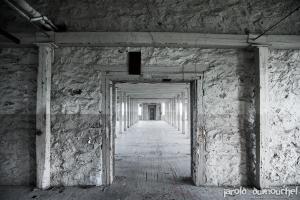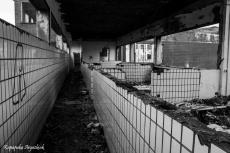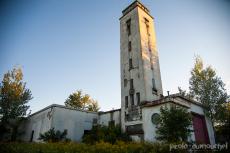From the outside, there is no indication that the plant is abandoned. No window is doomed and there is no "for sale" sign. Even the structure of the building is still in very good condition. I myself had doubts when I heard about it for the first...
The Stanley Tools abandoned plant
100 years of history of Roxton Pond
This is the result of a combination of circumstances which led the Stanley Tools company to settle in the region rather than elsewhere in Canada. In 1858, a man known as Sem Dalpe decided to settle in Roxton Pond because there was a strong Baptist community of which he is a member. He opens a factory specializing in Toolmaking and employs few workers. Others business man followed, and soon the reputation of the quality of its workers came to the ears of the leaders of the Stanley Tools who decided to build a factory in the village. Encouraged by few years of free property taxes, the plant was built in 1907.
Several expansions will follow in subsequent years. In 1930, there were already fifty employees. This number doubled at the beginning of World War II and will stand until 1966. In 1974, more than 300 workers work in the Stanley Tools company, a record for the company. Unfortunately, during the following years, the troubles of the company will increase and it will affect the profitability of the plant.
In 1984, it is consternation. The Stanley Tools plant ceased operations and will closed the book of one hundred years of toolmaking history in Roxton Pond. They accuses the economy and the overseas competition to be responsible for the situation. A total of 53 employees will be laid off. They accuse the company to have preferred to close its plant rather than negociate properly with the syndicat.
A few months later, the plant will be sold to Productions Ranger for $ 450,000 in order to transfer the operations of its industrial businesses located in Granby. 140 employees will manufacture helmets.
In 1996, the plant is sold again, this time to Patrick Charbonneau for $ 425,000. He wishes to establish an industrial motel. Despite investments of $ 150,000, this project will never come true.
Although Stanley Tools has left the region for a while, the company resurfaced in the news in 2001 when they will be accused of having contaminating the groundwater of Roxton Pond by their industrial activity. More than 650 residents are affected by contamination of their domestic wells with volatile organic compounds (VOCs). While the city is suing for $ 30 million the company based in United States of America, the saga will end in 2005 when the company agreed to pay $ 5.4 million to the city in addition to 520,000 $ to those who was directly affected by the notice of non-consumption of water.
Related content
In the Basque Country there are several generations who have grown up by drinking milk from the Beyena company, a regional source of pride, well beyond its nutritional values. Every day, hundreds of trucks were leaving the factory located in...
It is in 2004 that the old factory Belding Corticelli has been shut down. Since then, it has been abandoned and floors has been waved at the mercy of weather that infiltrate by the roof and windows. Long time ago, there has been manufactured...
The abandoned Val Rose plant is unquestionably one of the most famous spots in Quebec City area. And honestly, I was rather reluctant to go there. Not that I thought the spot wasn't interesting, but in general, a place known as the Val Rose is,...




















